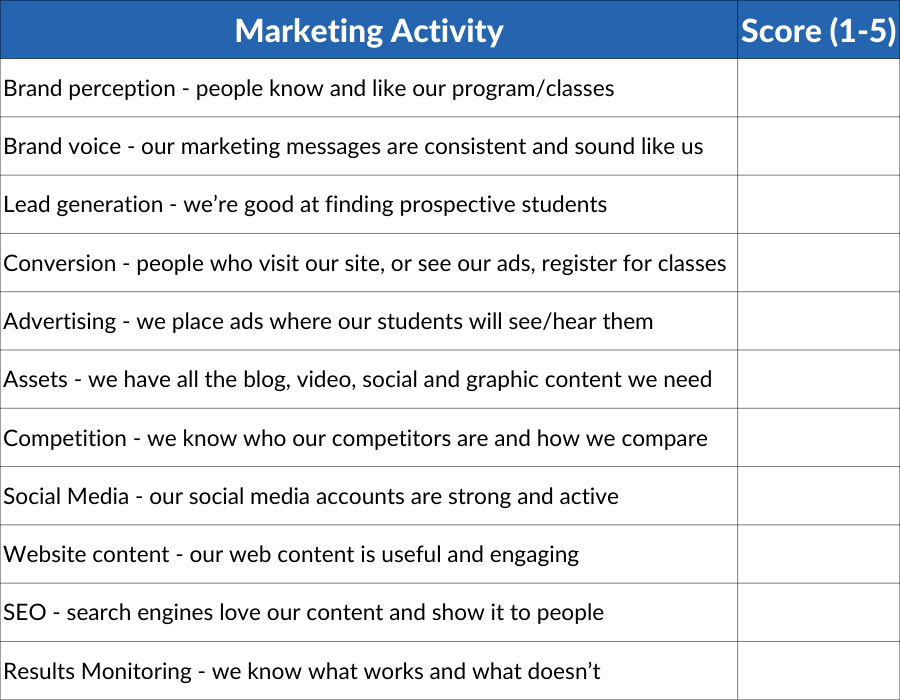Grow Your Program
How To's
How to Build A Strong Course Marketing Team From Scratch

If you’ve been handling course marketing on your own for a while, you may wonder if it’s time to bring in some experts. Building a course marketing team, or even just hiring a marketing professional, can help you save time and get better results.
Not that you aren’t doing a great job so far, it’s just that marketers are specialists. They’re pros at understanding your students, choosing and using marketing tools, and helping programs navigate the wide variety of digital platforms that can help market your courses.
We’ll help you understand the many different marketing specialties and uncover what you need to know to get the best marketing support.
Consider Your Budget for a Course Marketing Team
Budget is the number one reason programs don’t bring in course marketing teams. If you’re working with a tight budget (and who isn’t these days), you may worry about the cost of bringing in a professional. That’s an understandable concern, but it also misses a key point: Marketers make money for your program.
Some people see marketing as something that’s nice to have, but it’s actually essential. Students can’t enroll in classes they don’t know about. They won’t enroll in courses they don’t understand or feel excited about. By helping you find and register new students, and improving your relationships with existing students, marketers directly impact your bottom line.
A good guideline is to set aside at least 10% of total revenue for marketing. If you can do more than that, great. Well-designed marketing efforts should pay for themselves, and a marketing professional can help you make sure that they do.
Decide What Kind Of Help You Need
To figure out what kind of help you need, think about the marketing activities you’re already doing. Then try to honestly assess how well they’re working for you. Are you getting the results you want? Consider the activities that have been most and least effective over the last year. The chart below will help.
Score your effectiveness at each marketing activity on a scale from one to five: 5 says, “We’re nailing this,” and 1 says, “Please help!”

Click to download a fillable PDF.
Your scores may reveal that you need a stronger social media presence or should improve your conversion rate. There are marketers who specialize in each of these things and you might want to start by working with someone who can work toward that specific goal. More on how to do that in a minute. First, let’s talk about what to do if you’re scoring low across the board or you’re not sure where to start.
Marketing Strategist vs. Marketing Generalist
If you know you need support, but don’t know exactly what you need, we recommend looking for a marketing strategist or marketing generalist. A marketing strategist is like the architect of a house: they envision the final product and make a plan to get there. The marketing generalist is more like a general contractor, they use a wide array of skills and tools to put the house together.
- A marketing strategist is a big-picture thinker who can help you develop a strategic course marketing plan. They will assess your program–budget, revenue, students, marketing, and brand–and create a marketing plan for you to follow. It’s up to your team to put the plan into action. If you can do the activities, but need someone to direct them, you need a marketing strategist.
- A marketing generalist is someone who can produce many kinds of marketing content: emails, blog posts, graphics, videos, social media captions, websites, etc. They may not have the big-picture planning mindset of a strategist, but they can help you get things done. If you know what needs to happen, but want help putting the plan into action, work with a marketing generalist.
If you only have the budget to work with one marketing professional, a generalist or strategist is probably the right choice. For support in more specific areas of marketing, you might bring a marketing specialist into your course marketing team.
What Different Marketing Specialists Do
In medicine, some doctors specialize in specific body systems or parts. In marketing, some professionals specialize in specific marketing activities.
- Social media managers create a plan and content for various social media platforms. They use analytics to grow your audience and inform social media strategy.
- Content writers craft content for emails, blogs, websites, landing pages and more. They educate and inform your students about your program and related topics.
- Copywriters are a special kind of content writer. They create content that is specifically designed to sell your brand to your audience.
- Email marketers write emails optimized for conversion and sales. They might create a series of emails to keep prospective students engaged with your program.
- Graphic designers develop images like logos, banners, and informative graphics. They also can design layouts of web pages, brochures, flyers, or ads.
- Videographers produce videos for a website, ad, or social channel. They may script, record, edit, and produce the video or rely on a team to perform these tasks.
- Public relations (PR) professionals cultivate a program’s public image by interacting with the media to share news and answer questions. They might write press releases and coordinate media appearances.
- Marketing analysts dig into numbers like social media metrics, conversion rates, or competitor performance to help you make informed choices about your marketing strategy.
These titles are just guides to help you understand what type of help you might need. Keep in mind that some of the specialities do overlap. For example, a graphic designer may have video experience, a social media manager may be skilled at marketing analysis, and content writers may work on copy, emails, scripts and press releases. Depending on your needs, you might hire one or all of these specialists to join your course marketing team.
3 Course Marketing Team Models To Choose From
All of the professionals listed above can work in-house, at an agency, or independently as contractors. We’ll explore each model to help you decide which one might work for your program.
1. In-House Marketing Employees
In this model, you hire employees tasked with marketing. This could mean hiring a marketing strategist and letting them bring in freelancers for support, or hiring a full in-house team of specialists. In-house marketing teams are great for programs that:
- Have complex marketing goals
- Want full control over campaigns
- Desire fast turn-around
- Have the budget to expand their payroll
With an in-house marketing team, you’ll have a dedicated person or team available to you at least part-time. That means they can work quickly and focus exclusively on your program. Keep in mind that you’ll be responsible for payroll, benefits, and the usual expenses associated with hiring a new team member.
2. Marketing Agency
Marketing agencies bring together a team of experts to support your marketing goals, but your program will not be their only client. They tend to move a little slower than in-house teams. Marketing agencies are a great choice for programs that:
- Want a ‘done for you’ solution
- Appreciate a fresh perspective on their brand
- Are comfortable with longer timelines
Agencies offer a range of expertise you may not be able to afford any other way. They provide a managed approach so you can focus on other things. However, agencies tend to be costly and coordinating efforts with them can be time consuming.
3. Independent Consultants or Freelancers
If your program has short-term marketing projects or a focused goal, independent consultants or freelancers can help. They might help you build a blog, improve SEO, or complete any of the other marketing activities we’ve talked about. They’re the right choice if you:
- Have a specific project or goal in mind
- Want a personal relationship with your marketing professional
- Don’t have the budget for an in-house employee.
Many independent consultants and freelancers are self-employed or run their own business. They contract directly with clients according to the client’s needs. Some charge an hourly fee while others charge by project.
When you hire a consultant or freelancer, you don’t have to supply equipment or a workspace. They manage their own taxes and don’t get benefits. Keep in mind that you’ll be one of many clients so you may need to be flexible on your timeline.
Pro Tip: The best way to find reliable independent consultants and freelancers, is to ask other programs who they recommend or talk to small business owners in your area. If you choose to use popular websites like Fiverr and fellow freelancer site Upwork, or ClearVoice to hire a content creator, keep in mind that these sites do very little vetting. Ask for samples and references so you know you’re getting the professional quality you expect. The right freelancer can become a long-term and trusted member of your marketing team.
Get Ready to Hire A Course Marketing Team
All three of these models can be effective. Deciding between them comes down to your budget, needs, and preferred way of working.
By now, you should have the basic knowledge you need to start building your course marketing team. Remember that marketing isn’t just an expense, it’s an investment in the success of your program. That’s why CourseStorm offers built-in marketing tools like emails, website plug-ins, and more to help support your marketing efforts.
Start a free trial of CourseStorm today, or for more details on how our registration software can help you market your courses and register more students, contact our team.

Nic Lyons
Nic is skilled in scaling start-up edtech and education organizations to growth-stage success through innovative marketing. A former journalist and copywriter, Nic holds a postgraduate certificate in digital and print publishing from Columbia University School of Journalism's publishing course.
